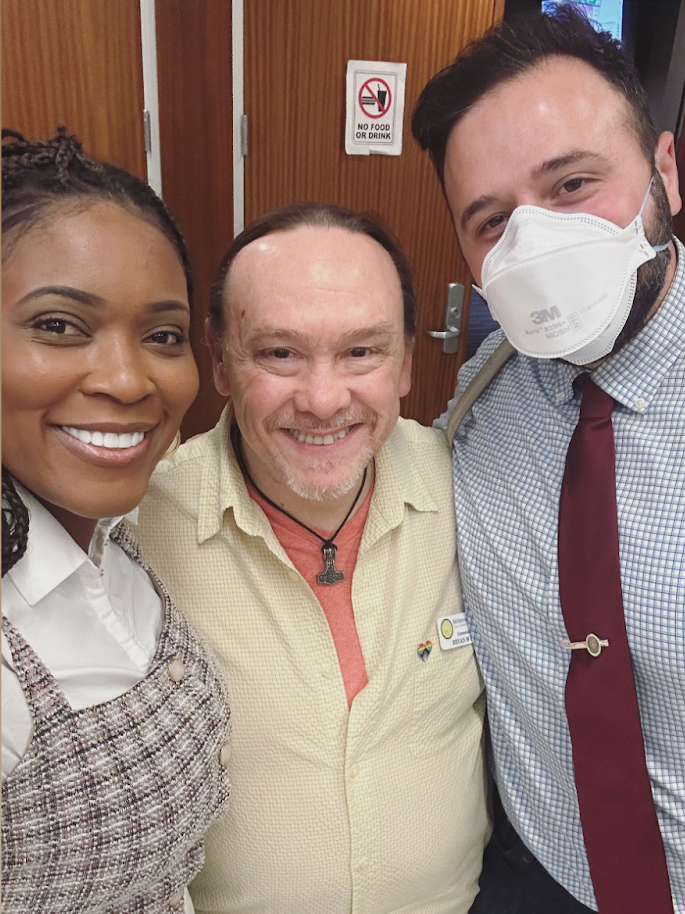
There are thousands of bus stops in the Bay Area and a significant number of them lack benches, which makes transit less comfortable, accessible, and appealing. However, as cities and transit agencies struggle with shrinking budgets, it can be financially infeasible for them to install new infrastructure such as bus stop benches on their own.
But we can fix this, and our big victory this week points the way.
Our allies at the SF Bay Area Bench Collective have installed and been maintaining benches at over 80 bus stops in the East Bay. However, the operation is in a legal gray area, which limits how the Bench Collective can recruit volunteers and forces them to operate in the shadows, throttling their overall impact.
To address this, Transbay Coalition has been working with numerous stakeholders for the past few months. Allies such as the SF Bay Area Bench Collective, Bryan Harris of the Richmond Commission on Aging, Richmond Councilmember Jamelia Brown, and Richmond Vice Mayor Cesar Zepeda have all helped pave the way toward legalizing the benching efforts – and last night, the Richmond City Council took a big step forward!
After a lively discussion, the Richmond City Council passed – without opposition – a policy instructing staff to create a permitting program that would allow community members and groups to legally install benches at bus stops. The policy, a first for the region and likely the state, sets the stage so that one day schools, community organizations, faith-based organizations, and many others can support their communities by building and maintaining bus stop benches.
“This victory was hard-fought and deeply meaningful,” said Jamelia Brown who championed the policy. “Some of my colleagues and staff raised valid concerns about safety and liability—which is exactly why this policy was necessary. For too long, residents have taken it upon themselves to fill the gaps in public infrastructure, building benches out of love for our community and a need that couldn’t wait… we matched that grassroots commitment with government action—creating a legal pathway that supports, not punishes, community care. This is what responsive, people-powered policymaking looks like, and I’m proud Richmond is leading the way”
H. E. Christian Peeples, an elected at-large member of the AC Transit Board, also recognizes the importance of such a policy. He explains, “a bus commute begins the moment a rider steps out their front door and ends when they arrive at their destination. Everything in between hinges on safety. As a board member with decades of experience, I recognize that AC Transit simply does not have the resources to install outdoor furniture at every bus stop. I also know that communities committed to supporting transit can drive transformational change. However, community efforts must align with established safety standards – particularly ADA requirements. That’s why the City of Richmond’s recent decision to establish clear guidelines for community-led transit improvements is both timely and essential.”
Now, Transbay Coalition will collaborate with city staff to draft the permitting process and installation standards, which are due to be brought back to the council for approval in the fall. Once the process is officially approved, it will be significantly easier to scale up community-led bus stop bench building and installations so that we can get benches at the hundreds of bus stops in Richmond that need them. Furthermore, other nearby cities will have the opportunity to use this precedent to set similar policies. Together, we can make the Bay Area a more transit-friendly place!
Our sustained advocacy is only possible because of supporters like you, and anything you are able to chip in to the effort helps us keep winning improvements that make the Bay Area an easier place to get around by transit, bike, wheelchair, and foot. If you are able, please support our work today!
Once the permitting process for community-led bus stop bench installation is set up, Transbay Coalition will co-host a big build and installation weekend, so look out for an invitation to that special event when the time comes. Also, we look forward to working with allies in more cities throughout the Bay Area to bring this program to their town!
Together we’re making a brighter future. Thank you so much for making this possible.

